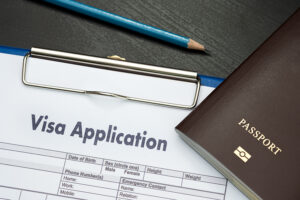
Ireland is a fantastic place to live and work. With thriving cities and stunning countryside, fascinating history and world famous cultural scene, there is something for everyone here. Employers are increasingly casting a wider net in their search for the best talent, and sometimes this means recruiting from abroad. There are huge benefits to both employees and employers in matching the right person to the right role, but when this means an international move, how complicated does it get? At CareerWise, we are highly experienced in all aspects of the Irish job market, and can help you solve each issue in your recruitment journey. Here is our guide to visas for moving to and working in Ireland.
Do I need a visa?
Ireland has long been a welcoming place, and the good news is that there are many countries whose citizens are not required to obtain a visa in order to work in Ireland.
UK citizens can move to Ireland and work with no need for a visa, with no restrictions or conditions – they will simply need proof of UK citizenship. The Common Travel Area arrangement that safeguarded these rights still holds post Brexit, so UK citizens can still easily come to work in Ireland.
EU, EEA and Swiss citizens are also able to come and live in Ireland with no restrictions or conditions.
Non-EU and non-EEA citizens
Generally, if you are from a country outside the UK and EU, you will need to apply for a visa before coming to live in Ireland. However, there are some exceptions to this rule, for instance, if you are a close family member of a skilled worker who has already emigrated to Ireland, you may already have an automatic right to work. To start your application, you need to register with the Irish Naturalisation and Immigration Service (INIS), or obtain more information from the Department of Business, Enterprise and Innovation (DBEI), who issue Employment Permits. You will need to obtain an Employment Permit before you apply for your visa.
There are many different types of visas available, but the two most important ones if you wish to come to Ireland for a job are the Critical Skills Employment Permit, and the General Skills Employment Permit.
Critical Skills Employment Permit
This is a scheme designed to cover the skills gaps in the Irish labour force, by encouraging foreign workers with the most needed skills to come to Ireland. The DBEI has a list on their website detailing which professions are currently covered by the Critical Skills scheme. Occupations that are in demand include roles in the sciences, teaching, engineering, information technology, health, and architecture. Roles that fall under the Critical Skills Employment Permit scheme do not need to undergo the Labour Market Needs Test.
General Employment Permit
This scheme covers roles that are not covered by the Critical Skills Permit. All occupations are eligible to apply under this visa, unless they are on the DBEI’s list of “Ineligible Categories of Employment for Employment Permits”. However, before you can apply for this type of visa, you must have a firm offer of a job in Ireland. There are additional factors that will affect the outcome of your application. These include:
The application process
When you apply for your visa, you will need to be able to fill out the online forms accurately and truthfully. You will then be asked for documentation to support your application, and this is likely to include your passport, work contract, contact details, details of any previous visa applications, and any other relevant documentation, such as evidence relating to the Labour Market Needs Test. You will also need to provide the details of your employer, and the details of your employment.
Are you hoping to relocate for a job in Ireland?
CareerWise is Ireland’s leading specialist recruitment firm, based in Cork, Shannon and Galway, and we can help you to find your ideal new job in Ireland. We specialise in the Engineering, Supply Chain, Science/Pharma, IT and Accounting industries in Ireland, and we look forward to working with you. Contact us online now or call us on +353 (0) 21 206 1900 to arrange a consultation.

Joe Robbins is co-founder of CareerWise Recruitment. A graduate of the University of Limerick (Degree in Business Studies, 1985), Joe worked in the UK for five years where he specialised in materials management, production management and plant management for a number of companies.
He returned to Ireland in 1992 to become Operations Manager for a Cork-based start-up, FMC Automotive Division which was subsequently taken over by Snap-on Equipment. Joe managed the business re-location of this company to Shannon in 1997 before setting up CareerWise Recruitment in 1999.
He is a committee member of the Chartered Institute of Personnel and Development (CIPD) Mid-West region, and a former Director and Vice President of the Shannon Chamber of Commerce. Joe is former Chairperson of the Sixmilebridge Camogie Club and current Chairperson of the Clare County Camogie Board.
CareerWise Recruitment. EastGate Village, EastGate, Little Island, Cork.
Phone: +353 (0) 21 206 1900
Email: info@careerwise.ie